People in Film: Bernadette Houdeib
May 22, 2011
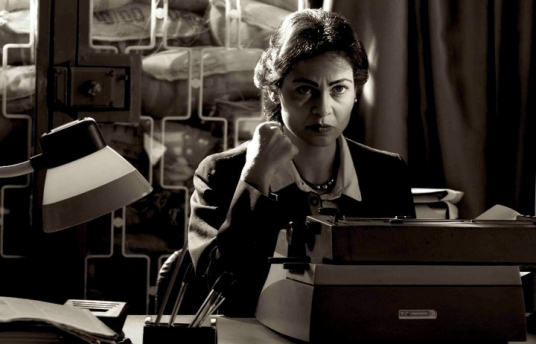
Bernadette Houdeib is a teacher of self-expression through movement at the University of Saint Joseph in Beirut, Lebanon. She is also a full time actress and mother. She started her career in acting 20 years ago, after studying acting and directing for the theatre at the Lebanese University. She has acted in sixteen plays, seventeen TV shows, and 5 films, including a major role in the film ‘When Maryam Spoke Out’ , directed by Assad Foualdkar, for which she received 5 awards . She has also received awards from several different theatre festivals for her work in theatre roles such as ‘Trio’ and ‘Arkhabil’, directed by Issam Bu Khaled, and ‘Sanaye Garden’, directed by Roger Assaf, and has received honorary awards for her acting career from The Ministry of Culture in Lebanon, the Syndicate of Actors in Lebanon, and the Lebanese American University in Beirut.
DFI: How did you start your career?
Bernadette: When I was in school I was in the folk dance troupe of Fahed Al Abdallah, and I did a lot of theatre activities, especially at my high school year. As soon as I went to university I started acting, and my teacher, Roger Assaf, asked me to star in some of his projects. That, basically, is how it all began!
DFI: Can you tell us some of the projects you’ve worked on, why you chose them, and what your favourite has been thus far?
Bernadette: I was still in university when I acted with Syrian actor, and Arab superstar, Dureid Laham in ‘The Little Bird’ and ‘The Rainmaker’. Co-starring with a big name such as Dureid made me a name in the region. ‘When Maryam Spoke Out’ allowed me my first big role in cinema, which I thoroughly enjoyed, but my ultimate love is for theatre. I love it because I am not just an automated person saying her lines: with theatre I can get more creative and be involved in the slightest details, from the script to the lighting of the set.
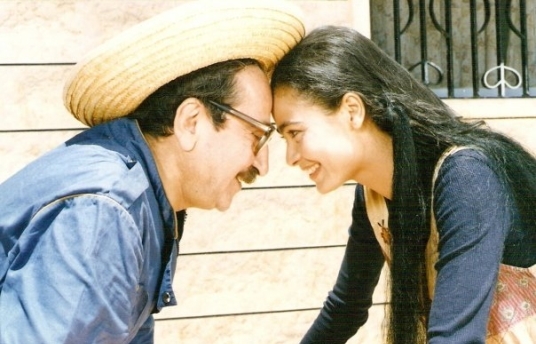
Bernadette (Right) with Syrian superstar Dureid Laham.
DFI: How is acting for TV and cinema different from theatre?
Bernadette: Theatre is home. Call it narcissism but I love it when people come to watch a play, they’re coming to watch me, Bernadette; to visit me in my “home” instead of being on their screen when they are probably not even watching, just chatting or eating. They come to the theatre, all dressed- up, because they respect me, they respect my work. There’s more intimacy and appreciation.
And the more experienced one gets, the more TV and cinema become a craft but not a feeling. You master the technique, you can make mistakes and repeat, you can call sick if you’re not feeling well. But in a play the feelings change every day – it’s not the same. You can’t make mistakes, forget, or not show up for any reason.
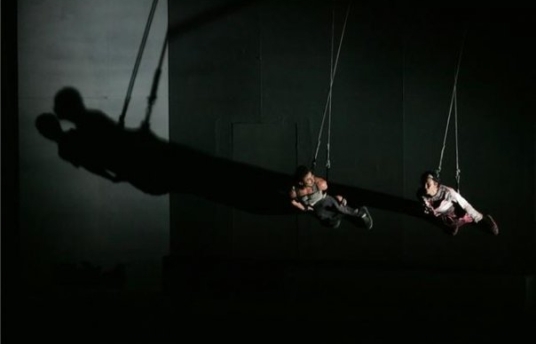
Bernadette on stage.
DFI: What are the main problems you face as an actress in the Middle East?
Bernadette: In Lebanon, we don’t have a proper syndicate – it’s more of an office that can’t do much in protecting the actors. And that’s not their fault; the reason is that we don’t have a law in the first place. Without a law The Syndicate of Actors can’t do much to protect our rights from producers, directors or whoever may violate them. Egypt and Syria have the strongest laws and syndicates in the region. In other words, we don’t have health insurance, so we don’t feel safe. We are always worried on what’s going to happen to us and how we are going to survive. We need to have different jobs for health insurance, safety and stability. On the other hand, in Lebanon acting jobs are usually picked according to personal connections, regardless if the actors are talented or not. This also forces us to act with very low paid and not so good actors, because it’s cheaper. Many people will do it because all they care of is being in front of the camera – they would even do it for free – when others have suffered for years working hard on themselves and studying. So in a way, yes: it’s not fair.
DFI: You are involved in quite a lot of humanitarian work. Can you tell us more about it?
Bernadette: That’s true, but we don’t do it for us. These people deserve all the time and care we can provide them with. I’ve worked for 4 years with children with special needs and orphans, and I did workshops for autistic children and shared with them the things we love. My husband and I are very picky when choosing our work, but when something like this is requested from us, we do it willingly and immediately.
DFI: Are you working on a specific project right now, and can you tell us about it?
Bernadette: I am currently working on a TV series called ‘Escape’, which is directed by Miled Abi Raad and written by Claudia Marchelian. I’m also engaged in another one called ‘Farook’, with Syrian director Hatem Ali. As for film, I have a guest role in a new film being directed by Jean-Claude Kodsi.
DFI: Do you have any projects for the future?
Bernadette: Yes – my children! To protect and teach them, so they can grow and learn. I also want, and need, to continuously work on myself. As for work related projects, in 2012 we will perform a play entitled ‘Banafsaji’ in Paris at Le Tarmac Theatre.
DFI: You are married to actor and director Issam Bu khaled. How do you find working with your husband?
Bernadette: It’s very hard to work with him! He is very demanding and has a lot of ideas. He’s a very visual person and images come first, from a very fertile imagination, so he expects the best from any actress because he wants to make sure his images and visions are implemented. So yes, it is difficult as an actress and a wife. No matter what you have at home, and no matter how much you try to hide it, it will pop out at some point in your work. I always say it’s the last time I work with him, but when we see the results, I feel I want to do more of it. He always shows the very best in every actor. He doesn’t usually ask me to act with him, and many times he says he doesn’t have anything for me. It takes a lot of time and effort to choose his cast because they should inspire, within him, the characters. Nothing is random with him. I always tell him that he should produce work more frequently, but he always says that if it is not an urge – if he doesn’t have that feeling of passion for the project, if there isn’t a strong drive forcing you into the work – then it’s not worth it.
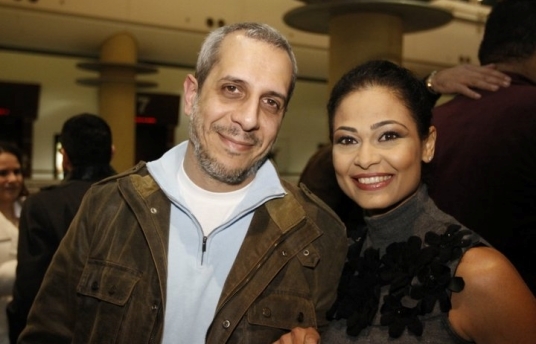
Bernadette with her husband, a director and actor Issam Bu Khaled.
DFI: Can you tell us how you balance being both a mother and an actress? How do you make it work for both?
Bernadette: I can’t say I am perfect at it, but the advantage is that I don’t work constantly because I choose my roles cautiously. And when I work, they are used to it: they know they won’t see me as frequently, and this has become part of the rhythm of their life. But my family and close friends are very supportive, and are always around them when I am busy.
DFI: What inspires you the most as an actress, and do you have hope in the future of Arab actresses reaching the international platform?
Bernadette: The roles I play are what inspire me to build everything around it. I see a passion and love for the work I’m doing – if I didn’t, I wouldn’t work. What matters greatly to me as well are the people I work with and the atmosphere of work, rather than the overall result. The human relations we make, what we can share with these people, what we can take away from each other as experiences and knowledge, this is what is important for me. As for becoming international, it is easier nowadays with YouTube, the internet, and the open connections worldwide, and it will get better I am sure. But in my opinion, let us focus on knowing the actors in the region first: focus on reaching the actors in the Arab world before focusing internationally. How much does the Lebanese audience know about actors from the UAE? From Saudi Arabia? We should work on linking to the actors within our own region, and promoting internally first, before going internationally.
DFI: What would you say to those who are planning a career in acting?
Bernadette: I always say that before starting a career in acting, one should think for a moment and consider whether this is what he or she really wants to do. If there’s one other thing they love as much as acting, then they should go for the other thing. Because acting should be your strongest drive, beyond anything else you want in life. If acting is all they love, all they can envision themselves doing, then yes: study, attend workshops, read a lot of books, work on your body and on your voice. It is a very difficult and demanding job, and the smallest mistake has a lot of consequences. Keep your self-respect and know your limits.
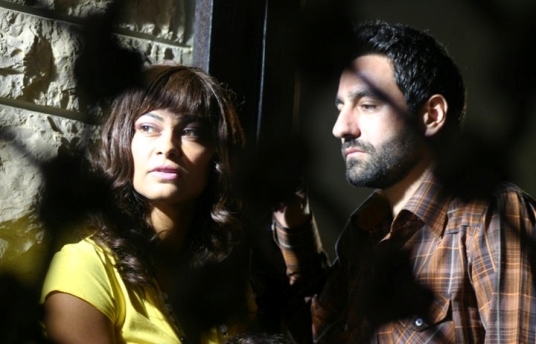
Bernadette in a scene from a TV series.
DFI: If you had to pick one film, from any genre or era, what would you say your favourite film is, and why?
Bernadette: It would have to be ‘Titus’ with Anthony Hopkins, because it has a lot of imagination, great acting, and excellent framing. I can watch it every day and continuously learn something new. The acting in it challenges me; I must admit I feel jealous! In brief, it really inspires me.